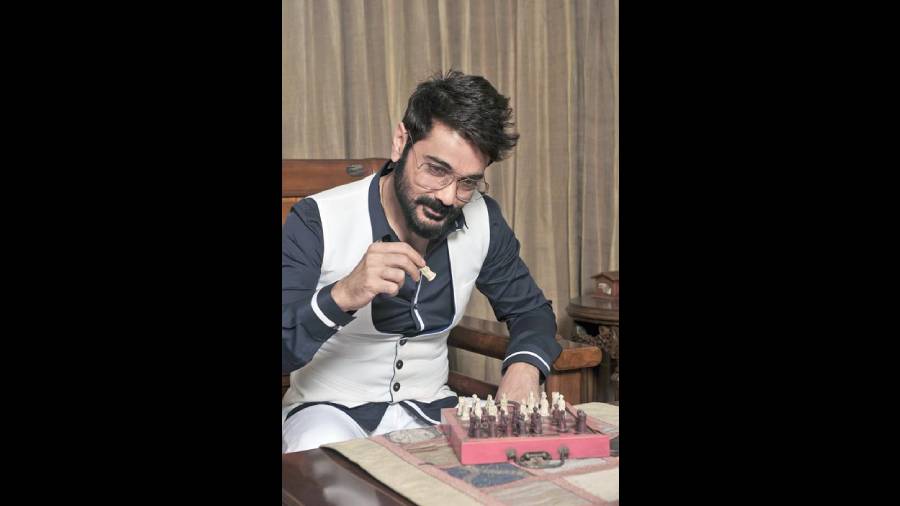Ever since I started making Bengali films, I have had a very warm relationship with Bumbada (Prosenjit). Through many ups and downs he has always been there for me. He often embarrasses me by saying that I will never work with him, though I have worked with all the big actors in Bengal. In July, I found myself staying at the same Mumbai hotel as him (he was shooting for an Amazon show). We would often get together for adda sessions. It was then that the journalistic bug bit me. I often interview important people in arts and culture where I get them to reflect on their lives and work, which is an inspiration to many. When I asked Bumbada for an interview that would be carried on his birthday, he readily agreed. Here he opens up in a freewheeling chat...
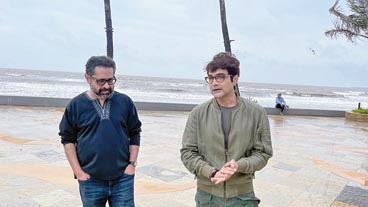
Suman Ghosh and Prosenjit in Mumbai
Ever since I started making Bengali films, I have had a very warm relationship with Bumbada (Prosenjit). Through many ups and downs he has always been there for me. He often embarrasses me by saying that I will never work with him, though I have worked with all the big actors in Bengal. In July, I found myself staying at the same Mumbai hotel as him (he was shooting for an Amazon show). We would often get together for adda sessions. It was then that the journalistic bug bit me. I often interview important people in arts and culture where I get them to reflect on their lives and work, which is an inspiration to many. When I asked Bumbada for an interview that would be carried on his birthday, he readily agreed. Here he opens up in a freewheeling chat...
Your birthday is an event in West Bengal. What special meaning does it hold for you now?
It is special, yes, but it is more special for my fans. A lot of people from outside Calcutta come down... and they have been coming for years. Every year.
You don’t do pure commercial Bengali movies any more. Such films also don’t happen. Don’t you miss the audience from the suburbs and villages?
Of course I miss them... and they also miss me. On social media, I get requests from my fans to do a Protibaad once again. Since those superhit films are shown on television, they get to watch them once again. They have many memories. Seeing my picture in an ad, someone said that it reminded them of Sobuj Saathi. They ask, “Why don’t I do a film like Sobuj Saathi once again?” They can relate to that. Those films are so popular that they are etched in their minds. My fans immediately point out the names of my films by listening to a few lines of dialogue. They do videos with the dialogues from Protibaad. The generation has changed but the films and the memories remain.
On birthdays, people often introspect. Do you have any regrets? For example, setting aside your star/actor persona, maybe you could have been more involved in family life or you could have given more time to your family? Or maybe you could have pursued a stronger career in Bombay?
Regret may not be the right word. There is a plus and minus point. I was offered many big Hindi films, but I could not do them at that point of time. Films like Saajan. I was shooting back-to-back films in Calcutta. Now when I look back, I feel maybe I could have done a few. Secondly, when you talk of Indian cinema, my name comes up. So I have achieved that. If you lose something, you gain something too. Of course, I have reached this place because of the support from my directors, technicians. When it comes to family life, I have never been a good father or a husband.
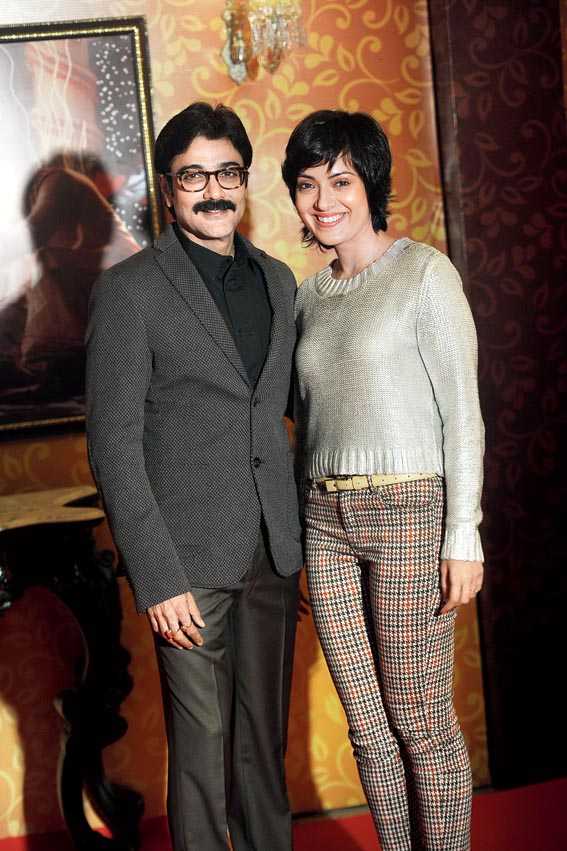

It is difficult to handle a person like me. When I was young, I was so driven, just focused on my career. At that time I probably did not have the attributes to become a family man. Arpita is with me for many years, it’s entirely her credit. It’s not my credit
Why do you say that?
It is difficult to handle a person like me. When I was young, I was so driven, just focused on my career. At that time I probably did not have the attributes to become a family man. Arpita is with me for many years, it’s entirely her credit. It’s not my credit. Things are different now. Now I spend time with my son. But people like us are always misunderstood in many ways. And after a point of time, we somehow accept it. We do not spend any more time explaining it. It is a reality and we face it. Same for my family. I remember we three were all set to take off for a Europe trip. But the offer for Shanghai came at that point of time and I knew that I had to do this film. I could not go. So we have to face a lot of challenges. Someone else in a different profession can take off... but we cannot. We have to wait for the right opportunity.
You have seen a lot over the years in your career. From the 1980s…
Oh yes! Then I used to do just commercial films. But I gave everything for the industry. You won’t believe the state of our studios then… in the NT 1 studios dogs used to roam around in the canteen. Then one day, I think it was the mahurat of a Bengali film called Bangalibabu. It was Mithunda’s first Bengali film after he reached his peak in Bombay. Anjan Chaudhury was the director. He was also top here. When I was entering the studio for some mahurat of my film — we used to get Rs 5,000 as advance — someone told me that we have to park the car outside. When I asked why, then I was told that the studio is filled with cars — after all it was a Mithun Chakraborty film. I got down from the car — remember I was also a superstar in Bengal then — and happily walked to the studio. I told them, this was my dream. To see NT 1 studio so busy. So we have come a long way. Not only me. Ranjitda (Mallick), Dipankarda (De), Dipakda (Chiranjit), Tapas (Paul), Benuda (Sabyasachi Chakrabarty)… at a certain point of time the situation of the Bengali film industry was so bad that all of them could have just left for other professions. Those who stuck around then are the real heroes.
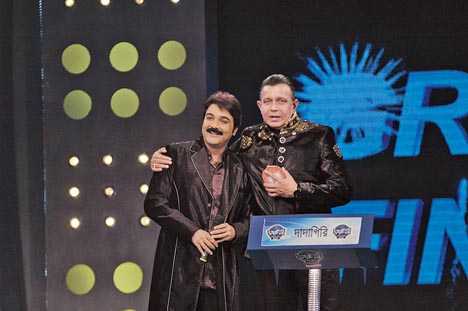
Prosenjit and Mithun

One must remember Mithunda did both commercial and serious cinema and he was successful in both.... In Indian cinema, there is a perception that heroes have a shelf life. Soumitra Chatterjee and Amitabh Bachchan managed to break that notion completely
There is a certain perception about you and Mithun Chakraborty and I want to clear that. How were your terms with Mithun Chakraborty? Was there any competition between the two of you in the 1990s or later?
There was no clash. He is senior to me. I have grown up watching his films like Disco Dancer. At that time he was primarily doing films in Bombay and occasionally came down to act in Bengali films. He was a national star but I had an economy running in Bengali films. There were some “well-wishers”, who are actually not well-wishers, who tried to tell me that Mithunda is coming and taking much more money than me.
Told them one thing — “You don’t know what level of a star he is”. I could not afford to compare myself with him. It is like Shah Rukh Khan now deciding to come down and act in some Bengali films. You see, I am a regional language actor. How could I compare myself with a national superstar at that point of time? Let me tell you another story. I remember a time when I got so moved watching Guru that I started crying. I called him up and congratulated him on his performance. Just around that time he did Fatakeshto and was delivering lines like “Marbo ekhane lash porbe shawshane”. Just imagine the range — Guru to MLA Fatakeshto. One must remember Mithunda did both commercial and serious cinema and he was successful in both. He earned the respect of the audiences through his performances.
You have evolved as an actor, from delivering superhits in the mainstream space to successfully working with important directors like Rituparno Ghosh, Buddhadeb Dasgupta and Goutam Ghose. From 2010 you started working with Srijit Mukherji and Kaushik Ganguly. You did one film with Aniruddha Roy Chowdhury. At one point of time you were shooting for Sasurbari Zindabad and Utsav simultaneously. How did you do that? Did you change your acting style significantly?
Not only the greats you mention but when I was doing hardcore commercial films, I did a film like Houseful. The actor has his or her own rhythm. I would understand the demands of a script and perform accordingly. I could switch easily, from doing a Swapan Saha film to a Prabhat Roy one. It is about being a professional actor and trying to understand what my director wants. The language of cinema is evolving, and one has to adapt and move with the times. One cannot just cling on to the past. Autograph and 22shey Srabon were trendsetters and both were commercial superhits. For me, it is a journey, from being popularly called Posenjit to becoming Prosenjit, thanks to Rituparno Ghosh who planted the germ initially. Now Srijit, Kaushik and Atanu (Ghosh) are nurturing the actor in me.
Who was your acting guru?
Soumitra Chatterjee. He is an inspiration. He was always open to new challenges. He had done it all, from theatre to cinema. In Indian cinema, there is a perception that heroes have a shelf life. Soumitra Chatterjee and Amitabh Bachchan managed to break that notion completely.
Why did you not go into theatre?
I started my career in theatre, doing shows at Star Theatre under the direction of Shyamal Sen. I have even done a show called Gourab when I was working in three shifts. Over the years I just could not manage to set aside time to work in group theatre. One has to give a lot of time for rehearsals. Maybe I would not be able to give 100 per cent to it. I just don’t want to do theatre for the sake of doing it or as a show off.
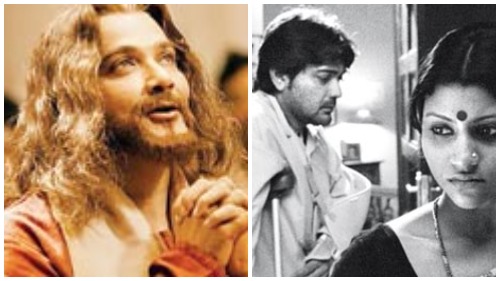
(L-R) Jaatishwar, Dosar
Two of your performances have stayed with me. Dosar and Jaatishwar. Both are acclaimed. How did you prepare for these roles?
I try to tap into the heart of the character... go to its depth, try to understand his inner world. There was no reference point for me for Jaatishwar. The development of the character came from within. Of course Srijit was there. There was a physical transformation. I used my eyes to express and emote in close-ups. It is important to understand the lens, for any actor. My eyes were constantly flickering as Kushal Hazra. For Dosar, my challenge was to portray my character in such a way that would evoke sympathy by the end. Shabana Azmi and Javed Akhtar watched the film and complimented me on my performance. They said that with such a character there was a tendency to be overdramatic in the performance. They were happy to note that I did not do that. I also had to maintain a certain tone in my dialogues. And for any role, I experiment a lot with make-up and dubbing. Nowadays sound technology has developed so much that you can emote at a very low level and the sound engineer will catch it. I often tell them, “It’s your responsibility to capture it. I won’t increase my delivery level.”
You recently shot for a web series by Vikramaditya Motwane. Do you feel acting for the small screen is different from cinema? Do you consciously change anything?
Not really, especially with the work they are doing, it is great.
You have never given any political view on anything but independent of the industry, an artiste has a political self. There is so much of unfairness going around but Prosenjit Chatterjee is quiet in all of this. I am not saying that you have to join a political party. What is your view on taking a political stance? Your guru Soumitra Chatterjee was always politically active, raising his voice to a lot of issues.
Firstly, I don’t think it would suit me. Politics is not my space. Amartya Sen can comment on an issue but somehow it won’t seem right if I comment on it. I don’t have such a stature. Secondly, in our industry-related matters, I have always taken a stance. I have been actively involved. I have held myself back from actively getting involved in decision-making matters in the recent affairs of the industry. It was an emotional decision that I took four years ago.
You were hurt somewhere?
Not only hurt, I was wounded. I’m an emotion-driven person. Maybe I can offer my advice on an industry-related issue if they come to me. But I won’t be part of any decision making. Other people can take it forward now. Sometimes I feel that those 25 years of fighting for the industry was not needed.
How do you take on failure or fight failure? Life is all about ups and downs... you have carried through it all...
I try not to think of success. And I am saying this very honestly. Even if you go through a lean patch, don’t just give it up. Try to learn from it. Don’t blame anyone. Think of what you need to do to come out of a failure. Introspect. And work hard and try to get past that.
You have been at the helm of the industry for so long. What’s the situation for Bengali films now? We don’t get to hear of a new Bengali film shaking things up on the national circuit the way Malayalam films are doing now...
Recently I got a call from Priyadarshan. He had seen my Jyesthoputra and was very excited about it. He congratulated me. The content of Bengali films have really improved in the last 10 years. A new generation of actors and film-makers have come up. But unfortunately, the economy side of the industry is not stressed. Our economy side of the industry has squeezed over time. Other industries like Tamil, Telugu etc have always stressed on the business side. Also, we have not been able to market ourselves so well as the others are doing. The only person who understood the national market was Rituparno Ghosh. If we had followed that path or focused on that drive, maybe things would have been different. We understand the content of cinema really well but maybe not the economy or how it works.
National OTT platforms like Netflix and Amazon are not picking up new Bengali films. An actor like Fahadh Faasil has become a national star now through his films that are releasing on OTT platforms like Netflix and Amazon.
I feel that the producers of the Bengali film industry should come together and address this. That would be my advice. The Tamil, Malayalam and other producers have done and achieved that.
What motivates you in life now? You were in Bombay shooting for a web series for two months... it is like starting from scratch there?
Every 10 years I challenge myself. I like to take risks, or else I feel one might stagnate. I am doing superhits like the Kakababu films or a film like Nirantaror or Mayurakshi. That is sorted. But what next? Where do I get my kick now? I would like to reach out to a new group of audiences of different age groups. I would like to create an identity for myself in a new space.
